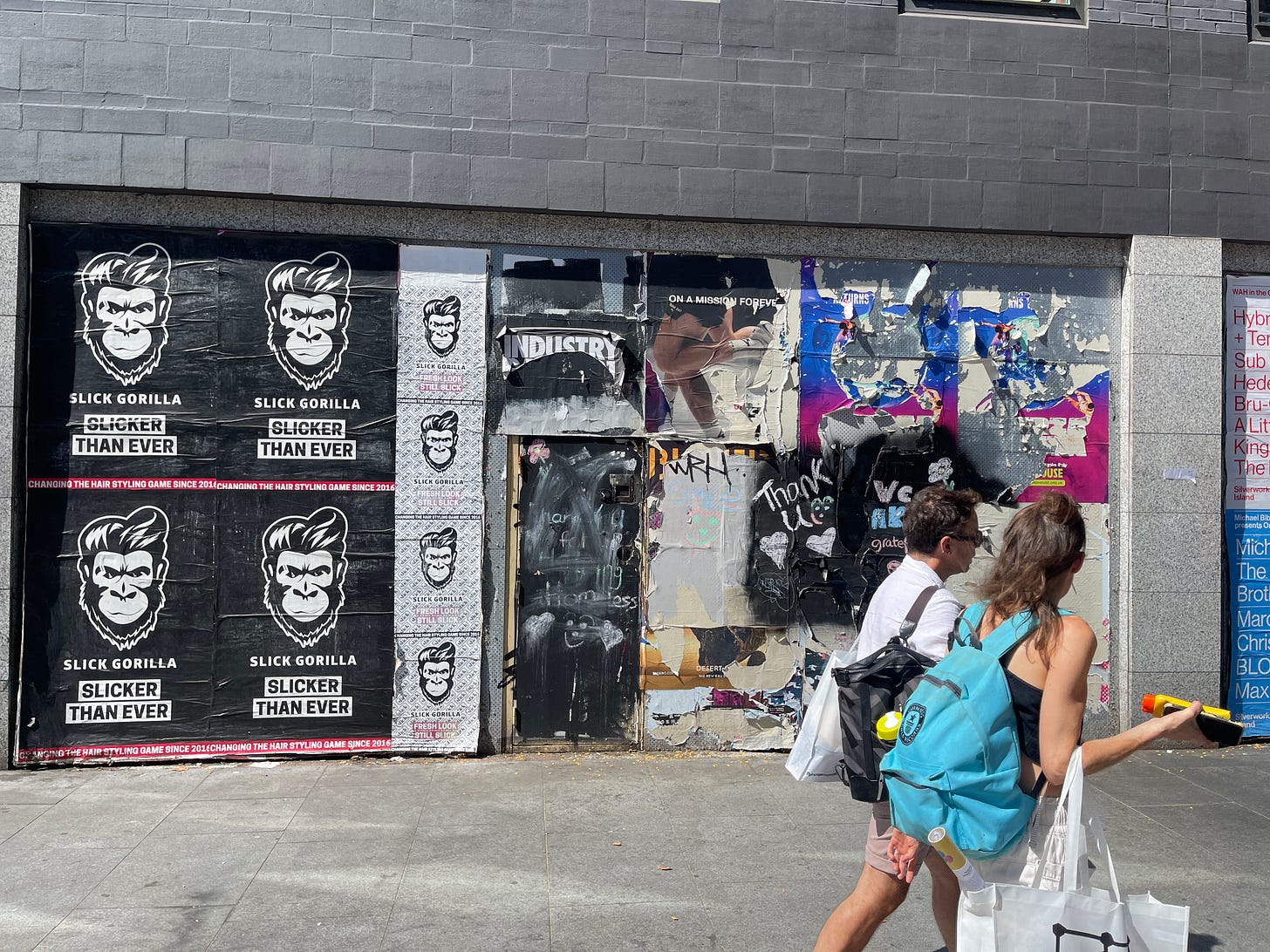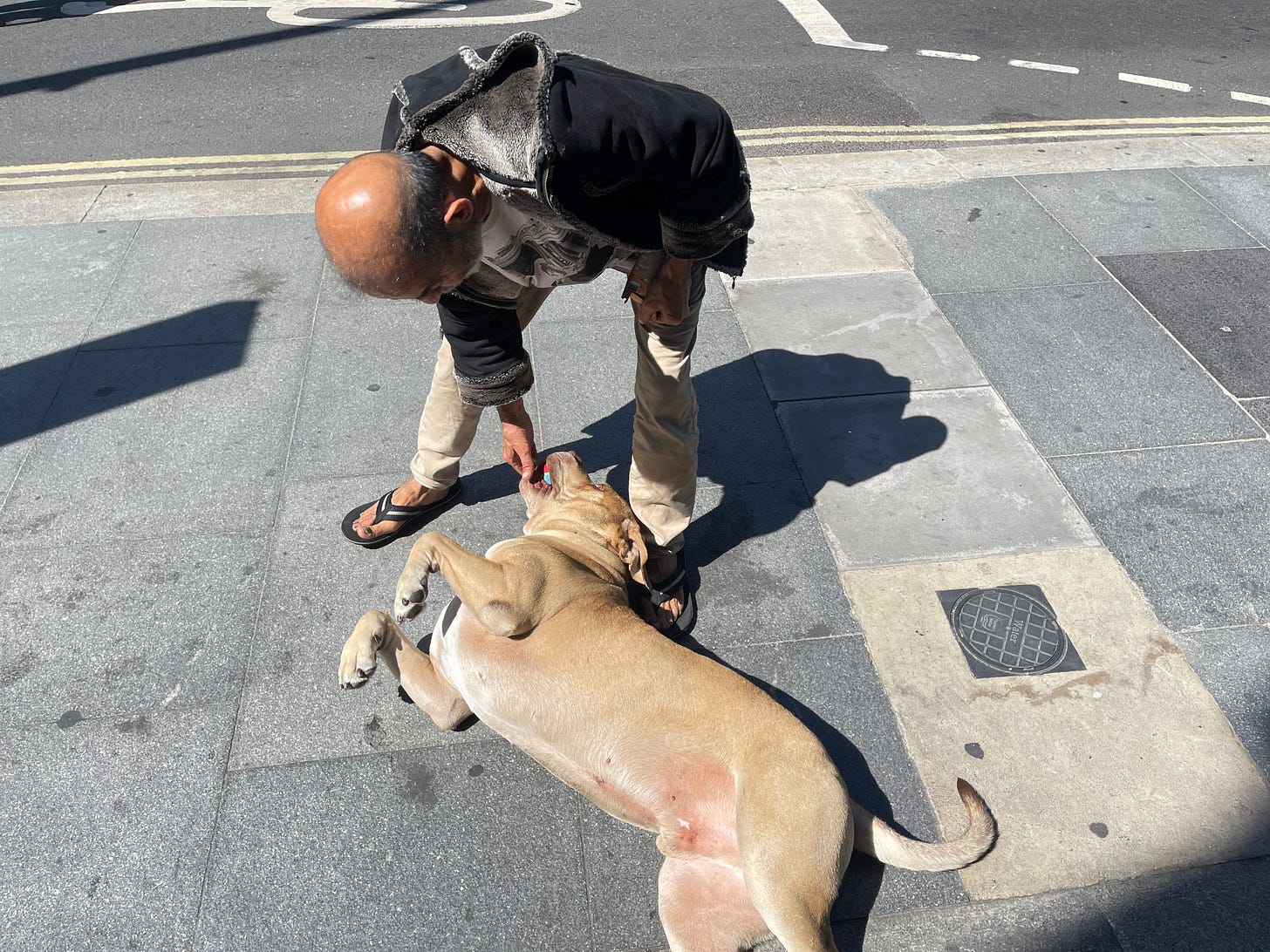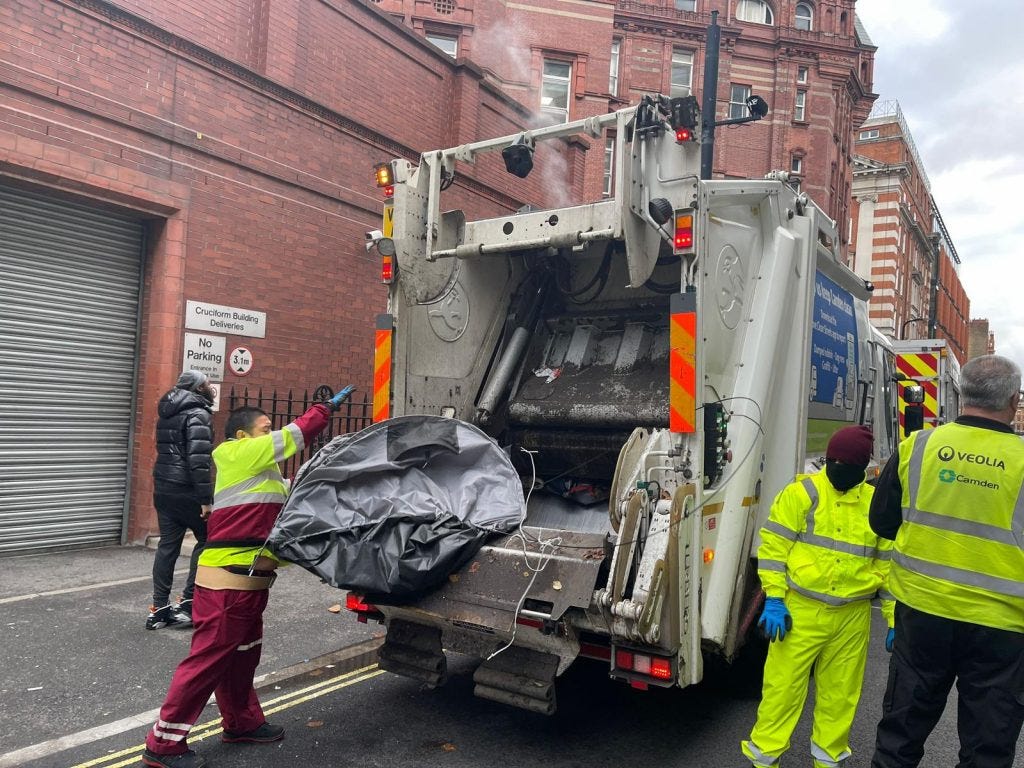Evicted from the pavement
In one of London's most famous streets, landlords are using eviction orders to move homeless people on
Hi all, we hope everybody had a good week and is taking care in the heat. Thank you to everybody who has subscribed to NewJournal+ this week, both free and paid. For this week’s feature, Frankie Lister-Fell heads to Tottenham Court Road where homeless people are being hit with eviction orders designed to ban them from the pavements. Frankie was named the UK’s journalist of the year at the last Regional Press Awards and her work shining a light on rough sleeping in London was part of that recognition. We may not have all the answers but we need local reporters here asking the questions, so if you can – please do support NewJournal+ with an upgraded subscription.
Meanwhile, look out for our politics column, the North London Bubble, later this weekend and our weekly news digest bringing you right up to date with everything that’s been happening sent to your inbox on Monday.
IN the windows of the upmarket furniture stores, sofas and tables are labelled with prices which would make a lot of us gasp. The cheap, slightly shabby hi-fi stores where you could once haggle for a better price on a radio or camera have gone, replaced by familiar food chains where you’ll break a tenner to get lunch.
But when you walk down Tottenham Court Road at night, it’s not wealth you notice, but the scattering of tents used by the homeless. Perhaps there isn’t a street in London where the divide between the haves and have nothings is most starkly observed.
With the sun in the summer sky, there may not be the same passing worry for those experiencing rough sleeping as in the biting cold of winter, but heatwaves like this weekend’s can feel oppressive when there’s few places to escape the burn.
And for the 149 people known to be on the streets– according to the council’s most recent street count – heat can kill. The figures show more homeless people die in the summer than in the winter. A thermal imaging photo of a tent on Tottenham Court Road on the last day of June showed temperatures inside hit above 50 degrees centigrade.
Over the past few years, this evolving central London high street has become a makeshift home for many who have no other option but to put up a tent in the boiling sun or freezing cold and try to survive.
They choose places where there’s safety in numbers and are sheltered from the elements: covered walkways, next to warm air conditioning vents of a hospital, or outside vacant shops.
But even in these precarious situations, they haven’t been able to stay for long. When people hear the word eviction, what they usually think of is unpaid rent and bailiffs banging down the door of a residential flat at the behest of a landlord, but in Tottenham Court Road property owners are going further and seeking orders to ban London’s vulnerable from the pavement.
This week, as the punishing heat continued, I spoke to those at the raw end of these notices and tried to find the property owners who seek them, a task easier said than done.
‘No one is a winner’
Over the last few years, rough sleepers have frequently been dealt eviction notices, asking them to pack up their things and move somewhere else.
A myriad of reasons have been used to justify this: public health, fire safety, loss of business, refurbishment.
The city became familiar with spikes to deter rough sleeping. When this became seen as unacceptable, more creative hostile architecture appeared: more subtle, but just as pernicious. It can be bike stands with little space in between them so no tents can be pitched or large planters sprouting flowers placed in strategic spots.
Number 110-113 Tottenham Court Road is a boarded-up shop, part of the building Project House. It came with a multi-million pound price tag when it changed hands eight years ago, but the ground floor is now decorated by tag graffiti and has stood unused since Halifax closed a long-standing branch, a now common trend for high street banking.
It’s here where a group of seven homeless people who have been sleeping on the pavement were approached this week by a bailiff giving them an eviction order that gave them a day to move.
Among them is Mel, 61.
He told me he doesn’t mind the heat as much as the cold, which bothers his arthritis, but as we chat and the sun keeps peeking out behind buildings he asks if we can move into the shade. He has moved some of his belongings that got soaked in the rain to dry in the sun.
He went to boarding school, studied law and speaks French, and he imparts a lot of sage wisdom. “You’ve got to be humble in life,” he tells me. “You know what they say. A fool thinks he knows it all. A wise man sits in a corner and he wonders about how little he knows.”
On Tuesday the group was handed the letter from Marston Recovery, working on behalf of the landlord. It said: “Your unlawful entry onto land / premises in possession of another is trespass for which a claim may be brought, irrespective of whether any actual damage is done.”
Mel said: “I was told the owner of the building doesn't want you out here, but we were on the pavement. It’s stressful. I’ve been here for a while. People get to know you and all of a sudden you have to move away. It’s frustrating being homeless as it is, and then having to move as well.”
He added: “No one’s a winner in this, but we’ve got to live. When someone says ‘I’m security, I’m doing my job’, I say well your job is important but not over my life.
“It’s been going on for a while. Bigger companies, bailiffs. It’s like they're playing a concerto in your head. But the only thing is, I grew up in a boarding school. And all of these tricks of the trade – I know them better than the prime minister.”
Camden Council said it was “not involved in moving rough sleepers from the site”. It said it had spoken to the individuals who were moved and offered them support.
While it stands unused, however, the landlord seemingly deems the presence of tents on a pavement outside a wall of posters and graffiti intolerable.
The Land Registry shows the freehold of the building was bought by a company called Velora Limited, which lets and operates real estate, for £24 million in 2017.
We always want to give the opportunity to explain decisions, but I tried to contact its two directors via the company it used to deliver the notice to the rough sleepers with no luck.
The registered address is a residential property in Mill Hill, but when I knocked on the door somebody else was living there and could not provide me with any contact details.
One of the directors has a medical salon in Cyprus. I called it and was told she was in a meeting, but I haven’t heard back. The offer of space for comment and explanation in our stories is always there.
The truth is that this trend is not really about one property owner, however. Mel and his companions are just one example of a trend in this area of people being asked to move on.

In 2023, a large group of people staying in tents outside the back of University College Hospital, where warm air vents helped give them respite from the cold, were ordered to leave by the Met Police. They were acting on a request from the hospital. Shocking images of people’s tents being chucked into bin trucks went viral on social media, a scene which Camden Council said it would never let its refuse contractors be involved in again.
UCLH said they had asked people to move on due to “public health concerns” and anti-social behaviour. It later submitted a planning application to lay down 30 bike stands and eight bollards where people had been sleeping.
A letter from the hospital said the “size and spacing” for the original bike stand there had “proved attractive to rough sleepers”, which “meant that UCLH has faced on-going problems with rough sleepers using the stands and meant that this has compromised security (bikes being damaged or stolen) and is preventing the use of the 28 spaces for bicycles by staff and visitors.”
In December last year it was deja vu. People sleeping outside the WHSmith and M&S in Tottenham Court Road were served a notice to “vacate” by the property landlord, which again happened to be UCLH, before Christmas.
That notice said: “This is formal notice that you are currently trespassing on private property. The property owner has not granted permission for you to be on this land and requests that you vacate the premises immediately.”
It warned that “failure to comply” would result in the removal of personal belongings and “legal proceedings against you for trespass”.
There were eight tents and one temporary structure positioned outside the shop, and people staying there left after the notice was put up on the window behind them.
A spokesperson for WHSmith said: “Following growing concern for the increasing number of rough sleepers outside our store at UCLH hospital, we worked with our hospital partner and engaged the police and local council, as well as private organisations, to seek support for those affected, and to ensure our store remains accessible for the hospital community we serve.”
Then in February, people staying in tents in Mortimer Market – including one of the men who had his stuff thrown into the trash outside UCLH a few years ago – was told they must leave as work on a new bakery was starting. The private security firm that patrols Fitzrovia, My Local Bobby, enforced the action.
Rachel Woolf, founder of the charity Street Storage which safely looks after rough sleepers’ belongings, explained the “stigma” surrounding tents.
She said: “There’s a huge stigma around tents. I’ve heard horrible things like ‘they’re eyesores’ and ‘it looks like San Francisco’. The reality is the problem is not the tents themselves but the system that has allowed this to happen.
“Asking someone to move doesn’t solve anything, it moves the perceived ‘problem’ somewhere else. It’s like councils and businesses pass the buck but removes the focus on the person as a human being who is being moved like they’re rubbish.”
She added: “It displaces communities of people who find solidarity, who may feel more secure in a certain area. I think there’s a lack of awareness of the trauma that move-ons can have on an individual.
“I understand there are different concerns from different sectors in society and some of them are valid but moving what they are considering a ‘problem’ to another place does not solve the ‘problem’.”
Camden Council told us this week: “Individuals may be moved on for their safety or the safety of others, and when this happens we will always ensure that everyone receives support to access housing options.”
It added: “We are clear that no one should be sleeping rough and we're doing all we can to address this.”
But there are barriers to people accessing the appropriate accommodation they need. In Mel’s case, he’s waiting for a hostel that will allow him and his dog Cain to stay. He told me it has been 18 months.
Along with long wait lists and lack of social housing, people who come from outside of the UK and have no recourse to public funds are not entitled to accommodation support. Or there are others who without a local ‘connection’ to the borough of Camden cannot get housing in the borough.
Still, moving people on does not address the underlying issues.
Elodie Berland of the homelessness outreach organisation Streets Kitchen said: “These guys keep being moved from one spot to the next. This area is just a hotspot of police, private security moving people on with no support in place. This simply has to stop.
“They have no support, they end up on the street, once they’re there, we all know they’re there for a long time. From the moment you get verified [as being homeless], from the moment you don’t get any form of support you’re on the street for a long time.
“They get moved on, they get harassed, ‘you’re not supposed to be here, you’re not supposed to be doing this or that, you’re not supposed to be using drugs when you have addiction and yet they can’t access adequate support.
“At the moment people are feeling really exhausted.”
You can find Frankie’s reporting homelessness throughout the Camden New Journal and Islington Tribune websites. Look out for your news digest winging its way into your inbox on Monday.








The people at the receiving end of these cruel eviction notices are not “homeless”, they are the unloved and abandoned of our deeply sick society.
In a so-called “free market economy”, there are no real market solutions for people forced into such unfair situations. Thus, if our illustrious marginally elected government officials fail to take steps to address such societal issues in a meaningful way, the cruel and uncaring are bound to take action, as this article makes evident.
Instead of learning largely useless information at schools and universities, we need to learn how to be decent, caring people. This should be our priority. Lesson learned, the rest would fall into place.
Brilliant article, thank you!
It's 2025 - we shouldn't have people rough sleeping outside. It is dangerous, negatively affects mental and physical health and lowers life expectancy. Rough sleeping is not a lifestyle choice and is complex as people have various reasons for being on our streets. They are fellow residents, human and need full support to get a roof over their heads. The government needs to build secure housing for the homeless and youths centres with support services as a top priority.